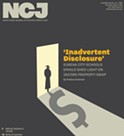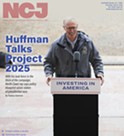'Inadvertent Disclosure'
Eureka City Schools emails shed light on Jacobs property swap
By Thadeus Greenson [email protected] @ThadeusGreenson[
{
"name": "Top Stories Video Pair",
"insertPoint": "7",
"component": "17087298",
"parentWrapperClass": "fdn-ads-inline-content-block",
"requiredCountToDisplay": "1"
}
]
As controversy swirled in the months after the Eureka City Schools Board of Trustees abruptly decided to forgo a $4 million purchase offer from the California Highway Patrol for its old Jacobs Middle School property and instead entered into an unusual $6 million deal with a mystery developer, the district's superintendent maintained he did not know who was behind the LLC named in the agreement.
For seven months now, speculation has swirled regarding who the principals in AMG Communities-Jacobs, LLC, a company legally formed just two days before the trustees' vote to approve its offer to trade a small residential property on I Street and $5.35 million in cash for 8.3 acres of the defunct campus. But a batch of emails recently released to the Journal in response to a request under the California Public Records Act indicate an attorney working for the district believed they were negotiating with a lawyer working for local businessman Robin P. Arkley II when forging the deal.
"Paul, whether we move forward with CHP or Arkley, we are going to need that survey for a precise definition of the portion of Jacob's being exchanged," Harold Freiman, an attorney with the high-powered firm Lozano Smith, which the district retained for help guiding it through the sales process, wrote in a Nov. 8 email to Eureka City Schools Assistant Superintendent of Business Services Paul Zeigler. "I will also ask [attorney] Brad [Johnson] if Arkley has someone he'd recommend."
The email followed another sent a week earlier to Ziegler and then Superintendent Fred Van Vleck in which Freiman proposes that if surveys of the properties involved in the exchange were needed the district could have the attorney it was negotiating with — Johnson — hire someone to do both "at Arkley's expense."
Current Superintendent Gary Storts, who told the Journal previously that the district had only been in contact with attorneys working for AMG Communities-Jacobs, LLC, and did not know who the company's principals were, was not included on either email exchange, so it's unclear if he was aware of Arkley's believed involvement.
In a statement, Arkley spokesperson Gail Rymer maintained that neither he nor his company, Security National Properties, is involved in the exchange.
"Prior to AMG's successful bid for the property, Security National Properties communicated with the District as a potential buyer and provided guidance regarding buying, selling and managing properties," the statement reads. "However, as we have consistently stated to you, Security National Properties is not a buyer of the Jacobs property and is not involved with AMG Communities, nor is Rob Arkley."
The statement did not answer specific questions asked by the Journal regarding when Security National was in communications with the district as a potential buyer for the property and who was contacting the district on the company's behalf, and Rymer did not respond to a follow-up email reiterating those questions.
What's clear in the emails released to the Journal is that Johnson is the district's sole point of contact when negotiating the exchange from early November through its approval by the board, and at no point is there any reference to a change in the client he is negotiating on behalf of or the basic framework of the agreement under negotiation. Johnson's involvement in the deal has long drawn speculation that the exchange is connected to Arkley, who has a vested interest in the future of the Jacobs site, as it is a key part of a ballot initiative he has bankrolled for the November ballot seeking to thwart the city of Eureka's plans to convert public parking lots in the Old Town and downtown areas into apartment buildings.
In addition to Johnson's central involvement in the Jacobs property exchange agreement — he personally signed both the purchase agreement for the I Street property and the subsequent exchange agreement with the district — he's been integrally involved in Arkley's other efforts to protect Eureka's parking lots. Specifically, he's served as the attorney for the Security National funded Citizens for a Better Eureka's lawsuits seeking to halt development of the lots and has acted as counsel for the Housing for All Eureka initiative, which is also funded by Arkley's company.
In addition to seemingly deepening Arkley's apparent ties to the exchange, the emails released to Journal also make plain that the district's primary interest in the exchange was the cash payment, not generating employee housing, which was one of the official reasons offered to justify the agreement. They also shed some light on why the district may have rushed to approve the deal with little notice, giving the public extremely limited opportunity for input, and suggest the district violated California open meeting laws in a way not previously known.
In the months since the board voted unanimously Dec. 14 to enter into the exchange, abruptly cutting off more than a year of negotiations with the CHP, public criticism has continued to mount.
Last month, the Humboldt County Civil Grand Jury released a report criticizing the district board for a lack of transparency and due diligence in the deal, saying it acted "hastily" and violated California open meeting laws' "general intent for public participation and transparency in decision-making." The nonpartisan League of Women Voters of Humboldt County then issued a statement saying it was "shocked and concerned" by the board's actions, asking that the district immediately make details of the property negotiations known to the public, fully disclose the names of all parties behind AMG and fully explain why the board felt the need for the "secretive, last-minute, quick judgment, in an intentionally compressed time period, without public knowledge, behind closed doors."
In addition to the issues of transparency and haste, there are other factors that have added to the controversy surrounding the agreement.
First, while state law outlines a rigid process public agencies must go through to sell off surplus property — first making it available to other public agencies and proceeding through a regimented bidding process — Eureka City Schools effectively sidestepped those rules by constructing the deal with AMG as a property exchange, even though 89 percent of its $6 million total value is cash.
Second, through the very public surplus sale process, many in the neighborhood surrounding the Jacobs property had become excited about the prospect of the CHP purchasing the site as the future home of its Northern Humboldt headquarters. Negotiations with CHP had gone far enough that the agency even held a neighborhood meeting to gauge community sentiment for the move, and officials later reported receiving an "outpouring of support."
Third, there are the connections to Arkley's efforts to protect Eureka's parking lots, which ran deep enough even before revelations in the recently released emails that the grand jury concluded the district's trustees "have been knowingly or unknowingly roped into the ongoing local housing versus parking controversy."
That "controversy" surrounds the city's plans, years in the making at this point, to convert 10 municipal parking lots into housing developments. Arkley has vocally opposed the plans, first in emails to and closed-door meetings with city staff, that, according to reporting by the Lost Coast Outpost's Ryan Burns, left Arkley proclaiming he was "furious" and had been "totally mistreated." In subsequent appearances on a local talk radio show, Arkley has explained that he sees parking as the "lifeblood" of local businesses and also charged that losing the municipal lots would cause a safety issue for his company's employees. If the plans move forward, Arkley has pledged to move Security National out of Eureka.
Arkley has since launched a multi-pronged attack on the city's plans, challenging them in court (so far unsuccessfully) and with the November initiative. If passed, the so-called Housing for All initiative would implement a zoning overlay that would effectively make development of the parking lots cost prohibitive by requiring any housing built there to not only replace any public parking spaces displaced but also that they provide spaces for residents. The initiative would also rezone the Jacobs campus to accommodate housing, which proponents contend would lead to the development of "hundreds" of new units.
But as the initiative began circulating in August, news reports pointed out that the Jacobs site was owned by a school district — not a housing developer — and seemed poised to be sold to the CHP.
Within three months, though, Johnson began negotiating with Eureka City Schools on someone's behalf on the property exchange the board would approve Dec. 14.
That deal, it's important to note, still has not closed, with AMG and the school district having twice now agreed to extend due diligence and escrow periods to allow additional time for the district to get a lot-line adjustment and subdivision from the city and for AMG to fix identified problems with the I Street property included in the exchange.
Storts told the Journal the district is hopeful escrow will close by the board of trustees' next regularly scheduled meeting, which is set for Aug. 9.
The emails recently released to the Journal stem from a request the paper initially submitted back on Jan. 19, seeking correspondences between district officials and representatives of AMG or referencing a proposed property exchange.
The district released almost nothing in response, prompting the Journal to reach out to Freiman looking to clarify whether that dearth of communications was because not many documents had been found or because most of what was found had been determined to be exempt from disclosure under state law and withheld.
Freiman told the Journal some documents — like drafts of the exchange agreement and the resolution needed to enact it — had been withheld under a deliberative process exemption, while some others had been withheld under attorney-client privilege, which holds that documents created for legal consultation or conveying an attorney's legal impressions, conclusions, opinions, research or theories are confidential. But when it came to correspondences between district officials and AMG, Freiman indicated there weren't any.
"The district was not able to locate any," he said at the time. "There was not a great deal of correspondences to be found. You basically have everything."
That seemed unusual, as we reported at the time ("Without a Paper Trail," March 7). Then, after reading a line in the Humboldt County Civil Grand Jury's report that noted Johnson and district administrative staff and legal counsel "sent and received many emails" before and after the Dec. 14 meeting, the Journal reached back out to Freiman via email, asking the district to "revisit its stance."
In response, Freiman wrote that he was not aware of any emails between Johnson and district staff, just ones between his office and Johnson that were then forwarded to district staff that he "believed to be protected by the attorney-client privilege."
"While otherwise likely to fall in the category of attorney-client privileged documents, certain materials were provided to the grand jury in light of their subpoena power and their assurance that information provided by the district would remain confidential," Freiman wrote. "Because the grand jury saw fit to share certain of that information in its report, and in support of transparency, the district is now making additional materials that were provided to the grand jury available to requesting parties, containing the same redactions as were contained in the records produced to the grand jury. This is not intended as a waiver of the district's attorney-client privilege generally or of Lozano Smith's work product privilege."
Freiman then sent a batch of 246 pages of emails, many of which included large swaths of redactions, with black highlights covering lines of text. But the district failed to fully hide the contents of the emails, the full text of which still appeared in the upper left corner of each page in small, invisible type. As such, the Journal was able to extract the full text of the emails and review it.
About a week later, Freiman sent the Journal another letter with the subject line: "Notice of Inadvertent Disclosure of Privileged Communications and Demand to Delete/Destroy or Return." In the letter, the attorney explained the district had learned that "contents of redacted, privileged, attorney-client communications were inadvertently disclosed due to a technical error in the application of the redactions within the response documents that allow for redacted content to be searchable." The letter went on to request that the Journal delete or return the documents and warn that "noncompliance with these directives may result in legal action."
But internal and external Journal analyses of the content of the emails indicates much of what the district redacted from them did not appear to be attorney-client privileged information, as it did not involve the request for or delivery of legal analysis or legal advice. Rather, much of what was redacted appeared to be information central to the property exchange negotiations, with Freiman acting as the district's negotiator, interfacing directly with Johnson, and then reporting back to district staff. As such, the Journal, after discussing the underlying issues with legal counsel, has decided to publish information that the district had intended to redact, but not information our analysis determined to be genuinely protected by attorney-client privilege or the attorney work product doctrine.
"If an attorney is working in another capacity, like as an investigator or as a negotiator, then the communications associated with that non-attorney work isn't protected by the attorney client-privilege or the attorney work product doctrine," explained Journal legal counsel Paul Nicholas Boylan.
One of the most striking takeaways from the email correspondences is that, as noted before, it appears to be Freiman negotiating the transaction on behalf of the district. While Freiman makes a single reference in the 246 pages to Van Vleck "perhaps" having discussed something with Johnson directly, there is nothing else in the emails to indicate Van Vleck or anyone else was interfacing directly with Johnson. Instead, it's page after page of Freiman discussing the particulars of the exchange agreement with Johnson as it takes shape and then reporting back to Van Vleck and Ziegler.
As such, the district appears to have violated the terms of the Ralph M. Brown Act when it published the agenda for the Dec. 14 meeting and listed Van Vleck as the person negotiating with AMG on its behalf. (This, it should be noted, is in addition to previously reported violations that included the district's failure to list the property it would be acquiring in the exchange on the meeting agenda and refusing to make a draft of the agreement and accompanying resolution available to the public at the same time they were made available to the entirety of the board of trustees.)
The emails are illuminating on other fronts, too.
The correspondence makes clear negotiations originally centered on an entirely different property than the one AMG ended up agreeing to include in the exchange. In early November, Johnson informed Freiman that his client would like to proceed with including a four-plex on Walnut Drive — consisting of three two-bed, one-bath units and one three-bed, one-bath unit — in the deal for the Jacobs campus. In one email exchange, Freiman and Van Vleck seem to take issue with the property being valued at $850,000.
"I just spoke to Brad," Freiman wrote on Nov. 14. "I told him that seemed high, and he said it was what it is taking to get the seller to come along, in a tight market (not a lot of inventory available), when the owner wasn't necessarily ready to sell in the first place. This will presumably impact the cash that flows to the district, which I'm guessing they will want to make the differential between $6 million and $850,000 ($5,150,000). That's still substantially higher than the $4 million offer from the CHP ... ."
Van Vleck then suggests having an independent appraiser determine a value for the property, which could then be deducted from the $6 million, or that they simply split the difference between Zillow's valuation and the sales price, which he said would come up to "roughly $710,000."
Freiman responds that appraisers are "notoriously backed up" and says the second approach is the better bet.
"Sounds good," Van Vleck responds. "I think they are using this as an opportunity to line the pockets of one of their friends. What 1 or 2 HUNDRED thousand amongst friends... Fred"
The Walnut Drive property remained the focus of negotiations until Nov. 29 when Freiman sent an email reporting the "plot thickened."
"Brad Johnson sent an email I'll forward to you in a moment," Freiman wrote. "In short, they are acquiring an entirely different property for the exchange."
In the forwarded email, Johnson reports that the owner of the Walnut Drive property "backed out" but that he'd identified a new property to purchase and include in the exchange, the one on I Street, which includes a home and an accessory dwelling unit.
While the district's stated reason for the property exchange in the authorizing resolution was "for the purpose of housing district employees in the future," no one in the email exchanges notes the loss of two housing units or multiple bedrooms resulting from substituting the I Street property for the Walnut Drive one. Instead, they discuss how the change would impact the cash part of the agreement. The final exchange agreement included $5.35 million in cash and valued the I Street property at $650,000 for a total value of $6 million. The Walnut Drive property had been valued at $850,000, according to the emails.
"Fred," Freiman wrote, "note that the valuation they included in the agreement is $650,000, meaning the district would clear $5,350,000, which is an improvement over the prior property they had proposed."
The following day, Ziegler responded, "I like the numbers, will check out the property later this morning."
The emails also shed some light on why the district seemed to rush the agreement through. In a Nov. 8 exchange with Freiman, Van Vleck seems to express frustration that Johnson hasn't provided more information on the Walnut Drive property that was then included in the exchange discussions.
"Other than it being a 4 unit multi family property across from Cutten School, Brad did not share anything," he wrote. "We need more information and they are at risk of a superintendent transition and CHP offer being accepted if they are not careful."
Three weeks later, with negotiations still ongoing, Van Vleck notes in an email to Freiman that the "timing is really a bummer," adding, "as a side note, I have included my successor Gary Storts."
Ultimately, the board's Dec. 14 approval of the property exchange came days before Van Vleck's planned retirement.
In addition to the criticism from the Humboldt County Civil Grand Jury and the League of Women Voters of Humboldt County, at least one Eureka resident has written the California Attorney General's Office, asking that it investigate the Jacobs campus transaction for possible violations of the California Education Code governing sales of surplus property, as well as other state and federal laws "concerning fraudulent misrepresentation."
The Attorney General's Office has not responded to multiple Journal inquiries about the request, so it remains unclear if it has taken up an investigation or plans to.
Meanwhile, in one of the last emails provided in response to the Journal's request, an employee at the Humboldt County Office of Education wrote Ziegler on Dec. 27 to inform him that a tree limb had fallen on the former Jacobs campus and was "a bit in the road," noting the district still owns the property "for now."
"It's too early for me to get into how I feel about Eureka City Schools right now," they wrote, adding a frowning emoji.
Ziegler responded later that morning, saying he believed a district crew had already taken care of the tree limb. Then, he addressed the emoji.
"Everyone will have their own take re: Jacobs," he wrote, "but at the end of the day, $6 million goes a long way in supporting our students!"
Thadeus Greenson (he/him) is the Journal's news editor. Reach him at (707) 442-1400, extension 321, or [email protected].
more from the author
-
'Profound Concern'
Alleged victim distressed by DA's handling of hate speech, antisemitic threats case
- Jul 25, 2024
-
Jackson's Retreat
The contract clause that allowed Cal Poly Humboldt's embattled president to step down into a high-paid instructional position
- Jul 25, 2024
-
Sheriff's Office: Two Killed in Kneeland Plane Crash
- Jul 24, 2024
- More »
Latest in News
Readers also liked…
-
Through Mark Larson's Lens
A local photographer's favorite images of 2022 in Humboldt
- Jan 5, 2023
-
'To Celebrate Our Sovereignty'
Yurok Tribe to host gathering honoring 'ultimate river warrior' on the anniversary of the U.S. Supreme Court ruling that changed everything
- Jun 8, 2023

































